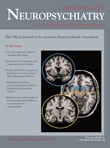Differential Cerebral Cortical Responsiveness Examination in Minimally Conscious Versus Persistent Vegetative States: A New Role for Neuropsychiatry and Behavioral Neurology
The recent reawakening of a patient after 19 years revives interest in the projected 10,000 plus Americans with either Persistent Vegetative States (PVS) or Minimally Conscious States (MCS). MCS has frequently been mislabeled PVS as these states are challenges to evaluate. This is because the two conditions are similar: In PVS, unconscious patients (>1 month) maintain sleep/wake cycles without responsiveness. MCS patients, instead, respond minimally to intermittent meaningful stimuli.
Ethical debates continue over lifespan, possible pain and discomfort experience, management to maintain optimal survival, prevention of complications, nursing, physical therapy and family attitudes in these patients.
I argue here that an early change in status of diagnosed PVS patients to MCS can be elicited via carefully demonstrated, differential patient responsiveness to familiar and unfamiliar individuals testing higher brain function: this is the specialized domain of the neuropsychiatrist/ behavioral neurologist. This early recognition is important as it may imply earlier appropriate rehabilitation and disputably impact on prognosis,
The following example clarifies:
A 20-year-old female developed Guillain Barre syndrome complicated by respiratory paralysis resulting in postanoxic encephalopathy and a PVS. After 27 months she was still labeled with PVS by a prominent neurologist specializing in PVS. His videotape reflected a classical neurological evaluation of such a patient. Responses to stimuli were labeled as reflexive and aversive: Indeed, many were (plantar extensor, startle response, palmar-mental reflex). No detailed clinical higher brain evaluation was performed. During neuropsychiatric examination shortly thereafter, however, she showed intermittently differential responses to both sensory stimuli and to verbal instructions from her caregivers (consistent nursing staff, family members) compared with those of the evaluating neuropsychiatrist. This early differential response was well demonstrated in nine different ways, sometimes using an ABA design. For example, when told the neuropsychiatrist would put his finger in her mouth, she clenched tightly. When the nurse asked her sweetly to open her mouth for her finger, she immediately complied. When the neuropsychiatrist requested the same, she clenched tightly again. These differential factors put the patient in a MCS because of the demonstrated intermittent minimal consciousness.
The medical confirmation of MCS provided impetus for more appropriate follow-through on her responses and targeted rehabilitation, This diagnostic awareness produced earlier interventions, jump-starting the relatively small improvements. By a year later, her MCS was clear as she exhibited consistent nonreflex responses to certain musical and TV-show stimuli, occasional verbalizations and ostensible awareness of when to pass urine and stools leading to contemplated potty training.
This earlier diagnosis using differential cerebral cortical testing with consequent rehabilitation could be generalized to others ultimately leading to more standardized subtle cerebral cortical approaches to MCS and PVS. These specialized examinations optimally extend the neuropsychiatric and behavioral neurological domains using subtle behavioral differential responses that are not in the usual armamentarium of the classical psychiatric or neurological examinations.



